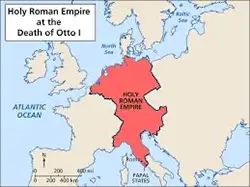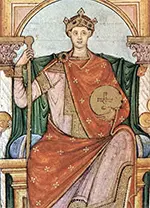Otto II: German King, Holy Roman Emperor
Otto II was Holy Roman Emperor and King of Germany for the better part of two decades in the latter half of the 10th Century. 
He was born in 955 in Saxony. His father was the reigning King of Germany, Otto I, and his mother was Adelaide of Italy. His father named him King of Italy in 961, in preparation for taking the throne of the Holy Roman Empire, which the elder Otto did in 962. Otto was his parents' third son, but the older two had died and so Otto was the heir apparent at just 6 years of age. His uncle Bruno, the Archbishop of Cologne, served as regent while the elder Otto was away. Otto I got involved in multiple disputes in Italy, involving rule there and in who was pope. The result was German control of northern and central Italy. Otto, now known as Otto the Great, sought an alliance with the Byzantine Empire. He then arranged for his son to marry Theophanu, the niece of Byzantine Emperor John I Tzimiskes, in 972. Otto II had joined his father as co-emperor a few years before. By this time, Otto the Great had decided to stay in Italy. Even though father and son were technically joint rulers, Otto I did all of the ruling. Once the royal marriage had been secured, the two Ottos returned to Germany. Within a few months of their return, Otto I contracted a serious illness. He died on May 7, 973. He had done a solid job of succession, however, because his son, already king and emperor, took over both thrones with no opposition. The boy had been king of Germany for 12 years already and emperor for five, he had no siblings to challenge the familial succession, and the nobles were generally happy with the new young king. The one point of contention that Otto II faced within the family walls was between his mother and his bride. Adelaide eventually left to live in Burgundy. Otto and Theophanu had five children, four of whom lived into adulthood: Adelheid (973), Sophie (975), Matilda (978), and Otto (980). The fifth child, Otto's twin, died soon after birth. 
The new king and emperor eventually found enemies, however. One of the most significant came, after a time, from within. One of his cousins, Duke Henry II of Bavaria, wanted more lands and influence than Otto was willing to provide and, incensed, led a rebellion against his monarch. Enough armed forces were still loyal to Otto that he was able to defeat Henry and capture him. Otto II also found enemies without, in the person of Harald Bluetooth, King of Denmark. His predecessor, Gorm the Old, had been happy enough with Otto the Great as his liege lord; the new Danish ruler had no such love for the new German ruler, and Harald rebelled, in 974. As against Henry, Otto eventually prevailed. Tensions with the neighboring Franks broke out into open warfare, as King Lothair IV led an army into Germany and damaged Aachen, the capital of Charlemagne and several subsequent rulers. Otto II responded by invading France, trapping Lothair IV in Paris. A French relief army under Hugh Capet forced the German contingent to retreat. Finally, in 980, Otto II and Lothair IV found peace. In that same year, Otto's heir, also named Otto, was born. Like his father before him, Otto II found that the role of emperor obliged him to become embroiled in Italian politics. When the Roman people imprisoned and then executed one pope and then another, Otto II marched at the head of an army to Rome. He had no trouble restoring Benedict VII to the throne and then settled in at Rome, making it his capital city. Also at this time, his wife and mother were reconciled. The emperor wanted to rule all of Italy and so set about maneuvering to do so. At the time, the Byzantine Empire controlled two large parts of what is now the southern bit of the peninsula. Otto's attempt to take those lands was unsuccessful. He also came up short in a drive to take the Emirate of Sicily from the Fatimid Caliphate. The two entities banded together to stop Otto, and they were successful, at Cape Colonna, on July 14, 982. The emperor returned to Rome and held an Imperial Diet, at which he named his son, Otto, who was then just 3, as his official successor, King of Germany in fact and emperor in waiting. Seeing the empire defeated, the Slavs in the east rose up against German hegemony and, after a series of battles, forced imperial forces to retreat behind the Elbe River, leaving the Billung March and the Northern March in Slavic hands. Thus was reversed one of the triumphs of Otto I some years earlier. Otto II also intervened in an internal struggle in Venice, imposing a pair of heavy trade embargoes on the island republic. The result was that both sides in the dispute agreed to pay homage to the empire. Otto II did not live to see it, however, because he died amidst a malaria outbreak, on Dec. 7, 983. He was 28. His son became Otto III. |
|
Social Studies for Kids
copyright 2002–2024
David White




